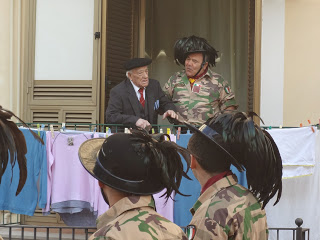The first weekend of November happened to be in my Italian hometown during the annual tradition of memorializing fallen soldiers 
Early that Sunday morning, the sound of the marching "Bersaglieri" military band piqued my interest. On this day did not expect to become a witness of emotional traditions celebrating the past which very quickly translated into new lessons for the future.
- In our immediate area, the "Bersaglieri" stopped in front of one of the condominium buildings. The band leader went inside and brought to the balcony an elderly gentleman named Raimondo Lavalle. Wearing a black beret with a military insignia and displaying multiple medals on his chest, Raimondo proudly beamed from the balcony at the soldiers' adulation. What is special about Raimondo is that he is over 101 years old. In the centenarian's face there was clear pride in being honored by his comrades in arms. The image from the balcony is below.
- The second event that stood out was later in the Piazza (town square) when they played Taps (known as "Il Silenzio" or "The Silence" in Italian) near the monument recognizing the fallen soldiers and civilians. As the trumpet solemnly echoed the notes, heavy tears were falling from Raimondo's face. Even at his age, he was still feeling the pain of the war long past and the comrades / friends whose names were engraved on that cold marble monument.
- At the end of Taps, Raimondo asked for the microphone and said " Citizens always remember the sacrifices of others and the traditions of this day. Children remember this moment as an important lesson on the meaning of peace."
In general, why are traditions important?
- Traditions provide the bonds to the past. They are legacy links that strengthen cultures. At the moment they are celebrated, they typically dissolve the differences between us and focus our thoughts on the events being memorialized.
- Traditions can be very painful, if they relate to personal or major social loss. Pain is typically a major driver of self-reflection. Depending on the level of pain or how close the actual event was to you personally, it can be very challenging to let the hurt flow away and restart a positive life once again. Understand that ultimately you are in control of your thoughts. Channel the painful feelings into action to move your life forward.
- Positive family traditions remind us that we are surrounded by multiple concentric circles of people that take the time to celebrate and strengthen the human bond. Traditions bring us closer together. For younger generations, they provide positive examples on human interactions and are the perfect exercise in building future social skills required for business success.
- For a successful future, traditions are bridges which must be crossed from the past to the future. Take the time to celebrate the past, but with passion shape your own positive future.
As witnessed with Raimondo on that bright Sunday morning, traditions bring forth the deepest emotions. They remind us of our humanity; the importance of family and friends. More importantly, they are moment to reflect that our time is ticking away. We will not ALL make it to 101 years old. Shape the life you always imagined and let traditions be the tollgates to measure your progress.
















